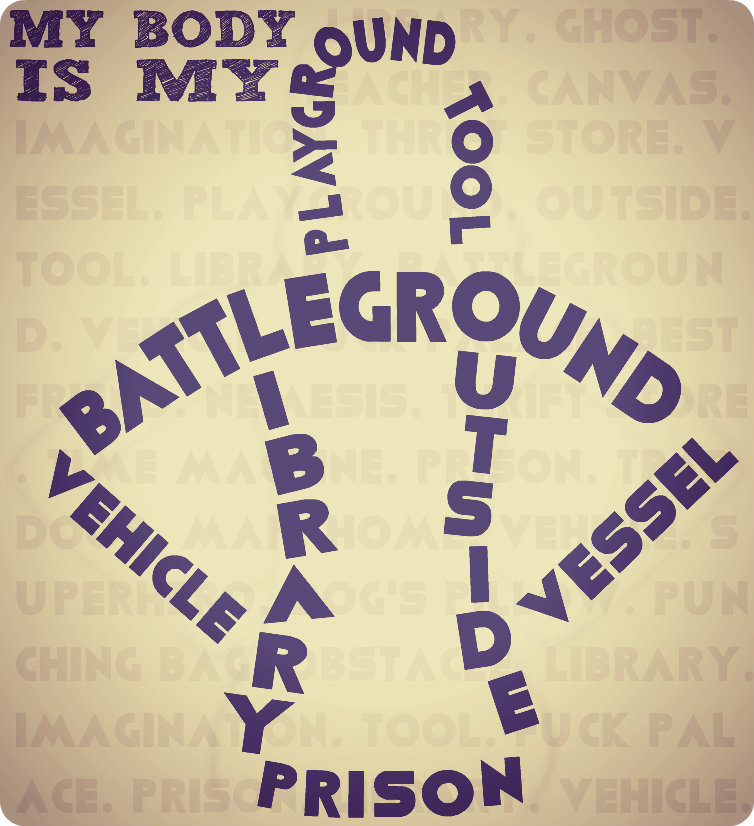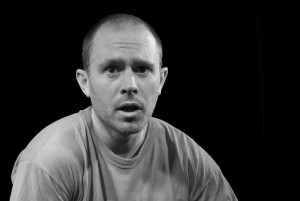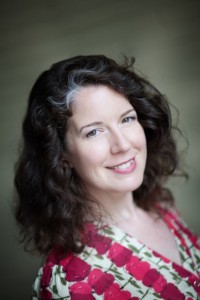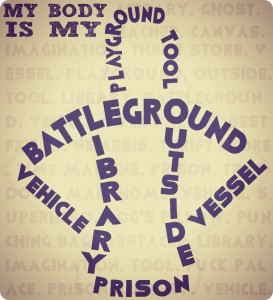 While the first performances for SoLow Fest’s wooden anniversary started yesterday, our artists are all at different stages of production. Some are re-memorizing old scripts, some are putting on the finishing touches on new compositions, and others are still hard at work in the studio.
While the first performances for SoLow Fest’s wooden anniversary started yesterday, our artists are all at different stages of production. Some are re-memorizing old scripts, some are putting on the finishing touches on new compositions, and others are still hard at work in the studio.
Needless to say, with over thirty individual shows slated to pop up across Philly from June 19-29, it can be hard to decide where you’re going to spend your pocket money.
To give you a clearer picture of what’s in store, freelance writer/performer Julius Ferraro conducts a series of flash interviews of our artists!
In this final episode, we talk about people talkin’ ‘bout bodies in West Philly and a double-bill: dark skies and stalkers in South Philly.
 Chris Davis probably doesn’t need an introduction but who cares I’m gonna give him one. Performer, writer of three solo performances, drunk savannah predator, and actor who’s worked with a variety of companies across Philadelphia, Davis is heading to Edinburgh this summer with his well-loved play Drunk Lion. We chat about his newest SoLow contribution, Bortle 8:
Chris Davis probably doesn’t need an introduction but who cares I’m gonna give him one. Performer, writer of three solo performances, drunk savannah predator, and actor who’s worked with a variety of companies across Philadelphia, Davis is heading to Edinburgh this summer with his well-loved play Drunk Lion. We chat about his newest SoLow contribution, Bortle 8:
Julius Ferraro: Chris, what’s a Bortle and what’s it got to do with me?
Chris Davis: Bortle has everything to do with you! Well, specifically it has to do with the sky and light pollution. John Bortle is an astronomer and he invented a light scale, the scale measures the astronomical observability of celestial objects in the sky and the interference caused by light pollution. Basically it’s how many stars you can see in the sky. Technically Bortle 8 is actually the “city” sky meaning you can’t see any stars. But on the NELM scale (Naked Eye Limiting Magnitudel) Bortle 8 is complete darkness. So depending on your scale, either you have a complete city sky or complete darkness. The show moves in between those two ideas, a world full of light pollution, and a world devoid of it.
JF: Do you remember a series of events or moments which inspired this piece?
CD: Bortle 8 started I was listening to NPR, and I heard about this book called “The End of Night” by Paul Bogard. The book is about one guy trying to find “true” darkness in the night sky, as not much is left in the world. I loved the idea of it, this guy going out there and searching for true darkness. I took that idea and sort of applied it to my emotional state at the time, like what was the “darkness” I sought? Specifically I was thinking of darkness inside of myself, a recent breakup, or random bouts of depression, a myriad of things, and thus began my “true” search for darkness.
The book brings up interesting ideas about light; like how we associate light with safety (although there is actually little correlation), how the world has changed so drastically in 100 years due to electric light, how we the entire history of mankind used stars in religion, science, math, everything, and yet now all of a sudden humans can no longer see stars in the sky, for the most part. We are disconnected from them in a way that we’ve never been before. It made me think about society in general and how we blindly embrace progress and ignore its consequences . . . I think that’s normal, really, but in terms of the sky, I had never thought about that before.
JF: How’s Bortle 8 unlike anything you’ve done before?
CD: Bortle 8 combines a lot of the conventions I used in my previous two solo works, Violence of the Lambs and Drunk Lion, into one. I’ve learned a lot from those shows, techniques on how to present the work, what works with audiences, ways to physicalize multiple characters, performer experience, so on, I feel more confident making Bortle 8, like I sort of know what I’m doing now. And therefore I know what techniques to use and when to use them. And the story itself, searching for darkness, I feel is universal. It is not only about the stars in the sky, or the lack thereof, but also the parts of our own psyches and selves that remain unexplored, like an ode to darkness in a world saturated with light.
There is so much pressure in the 21st century USA to present an image of happiness at all times, contentedness, normalized behavior, and then tie in a country awash in psychotropic drugs that treat depression, I feel there’s a lot of negativity towards negativity. The truth is in not knowing stuff, in exploring those dark patches within ourselves, there can be a lot to be gained, self-actualized, especially when trying to learn how to be human and navigate such a complex modern life. I believe we are mostly messy and jumbled creatures that want to make sense of everything even though life refuses to comply, I think Bortle 8 allows us to embrace that mess and explore what it means. What can we find within the darkness in ourselves? Or in the night sky? Is what happening to the sky a reflection of what is happening to our society, a disconnect from something universal, something bigger and more powerful than us?
Bortle 8
Creator: Chris Davis
Director: Mary Tuomanen
Double-bill with Corinna Burns’ Internet Stalker
June 25th & 26th @ 8pm, 27th @ 11:30pm, 28th @ 10pm
A home near the corner of 4th and Tasker
RSVP with bortle8stalker@gmail.com for precise address
 Double-billed with Chris is Corinna Burns’ Internet Stalker. Burns is a theatermaker who’s performed with Pig Iron, Theatre Exile, Flashpoint, among others, with various Fringe projects scattered in there. Though she’s always considered herself a writer, she’s finally taking the playwriting plunge.
Double-billed with Chris is Corinna Burns’ Internet Stalker. Burns is a theatermaker who’s performed with Pig Iron, Theatre Exile, Flashpoint, among others, with various Fringe projects scattered in there. Though she’s always considered herself a writer, she’s finally taking the playwriting plunge.
JF: Tell me about creating Internet Stalker.
Corinna Burns: I’ve always considered myself a writer, although it’s only been in the past year that I’ve been trying to focus on doing more writing. This is a piece that I wrote kind of on a whim that went to a much darker and more interesting place than I thought it would, and it’s kind of an odd length, so I wasn’t sure what to do with it. I have several friends who are writing their own monologue material and I felt that SoLow would be a great forum to develop the piece as a monologue and have the chance to see how my words land in a theatrical setting. That said, it’s going to be a super simple performance—again, because I’m interested in discovering how my writing lands on people’s ears. I’m curious to see if this piece succeeds.
JF: What can we expect? What’s it got that nothing else in SoLow will have?
CB: You should expect a show that goes to a pretty emotionally raw place. The simplest answer is that the piece is ultimately about alcoholism, and what that does to families and to one’s ability to connect. It’s a piece that uses language to construct a version of the performer (me) who hopefully becomes vulnerable even while she exposes/expresses her inability to do that very thing.
JF: Do you remember a moment or series of events which inspired this piece?
CB: For reasons that I won’t elaborate on but which anyone who’s ever done this can probably figure out, one afternoon I found myself in what I like to call a Social Media K-hole, in which I realized I had just spent three hours sitting on my living room floor, looking through a stranger’s Instagram feed. And I thought, “this a thing, I need to write about this.” And so I did. I started writing about this stranger, but of course I’m really writing about myself. A version of myself.
Internet Stalker
Corinna Burns
Double-bill with Chris Davis’ Bortle 8
June 25th & 26th @ 8pm, 27th @ 11:30pm, 28th @ 10pm
A home near the corner of 4th and Tasker
RSVP with bortle8stalker@gmail.com for precise address
Kaycee Filson grew up in a cornfield outside of Philly—or, more likely, in a house in a cornfield—and now flourishes among the New Orleans indie theater scene. To Filson, art is activism. She is a director, performer and slam poet, and her 2014 SoLow contribution, BODY Play, presents 13 monologues drawn from uncut interviews about bodies.
JF: I’d love to hear a bit about the New Orleans theater/performance scene.
Kaycee Filson: It’s pretty small, super-community based, but you can pretty much do whatever you want. The smaller companies are really doing a lot of the heavy lifting in terms of keeping the theater scene moving. What I love most about it is that it’s incredibly collaborative. And because it’s such a small city, and the art scene feels so intimate, a lot of the work happening seems to value interactivity and participation from the audience. There’s a huge spoken word scene here.
JF: You leave the uhs and ums in the interviews. Why’s this important? What’s that do to the piece, and how’s it affect you, as a, uhm, performer?
KF: It’s so hard! Everyone has this kind of “filler speech” that they use when they’re thinking off-the-cuff and everybody is different. People that I’ve interviewed who have seen or read the piece have been embarrassed that they say “like” or “um” that much, but it’s a totally human thing! No one is perfectly eloquent all the time, especially when they’re being asked really difficult questions. In doing solo work, you’re choosing the version of yourself or your character that you want to represent on stage. Even when you’re trying to portray the most honest version of yourself on stage that you can, you’re always going to be self-editing and selecting certain character traits. Keeping the “ums” and “uhs” in each interview was the easiest way to try and keep character in tact. I didn’t want the editing process to be heavy-handed or manipulative so I chose excerpts from each interview rather than piecing together bits and pieces. Each “monologue” in the piece is an un-edited, real time chunk of the conversation. I think there’s some pressure in solo pieces like this one where it’s just a collection of monologues, to try and get the audience to suspend their disbelief and marvel at your ability as an actor that you can portray all of these different characters so seamlessly. The process of creating this piece, sitting down with regular folks and asking them about their bodies, is just as important as the piece itself and I wanted the audience to see the form in the performance.
JF: Do you remember a moment or series of events which inspired the creation of the piece?
KF: I was taking a solo performance class in college and our first assignment was to interview someone close to us about an event from their lives that was important to them. Super vague. Basically, we could talk to anyone about anything. I interviewed my best friend of 20 years since she’s definitely the most important and influential person in my life. She struggled with a really serious eating disorder when we were in high school and college and she decided to tell me about the first time her parents found concrete evidence of her purging and confronted her about it. This woman and I were inseparable for most of our lives, I thought I knew everything about her life, and I had never heard this story before. It made me think about how people construct their personal narratives, which pieces they choose to showcase, which pieces they hide, and what happens when you sit down and ask people to talk about whatever they want, however they need to work through it out loud. I interviewed a couple of other people for the initial draft of BODY Play that I presented as my final for the class and, in doing so, realized that I had absolutely no story. I had no relationship with my body at all. I think it’s because I live really in my head and I’ve kind of had to separate the body and the brain for self-preservation sake. I live with a pretty all-encompassing mental illness that drives a lot of my life and I think, in learning to live with that, the rest of my body has just come secondary. Maybe working on this piece is a way to develop more of a relationship with my body. Maybe that’s bullshit. I’m still not sure. But every single person I’ve talked to has had a story, a lot of them, even if they weren’t sure they did—and that feels important enough in itself.
BODY Play
Kaycee Filson
June 26-28 @ 8pm
House at 49th & Catherine
RSVP at liveoaknola.org to receive precise location

